The man behind the festival that 'united the African Diaspora'
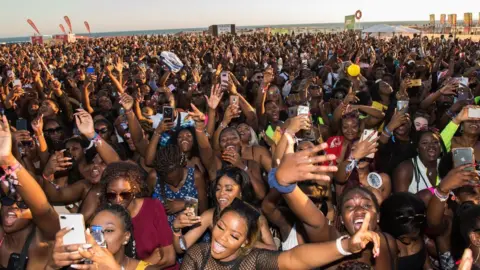 Michael Tubi
Michael TubiLast week saw 20,000 people of African descent gather on the beaches of Portimao, Portugal.
They were there for Afro Nation - billed as the first festival to celebrate the African Diaspora.
In its debut year, the "historic" four days featured live music from Nigeria, Ghana, Tanzania, Jamaica, the UK and the US.
And who was it organised by? A 34-year-old Nigerian promoter from Dagenham, who goes by the name SMADE.
SMADE, real name Adesegun Adeosun Jr, had the idea in May last year, inspired by a vision of creating an "unforgettable experience" that would "celebrate love, peace, unity and the beauty of African culture".
Alongside his business partner, Obi Asika, they started building a "strong team of people" and swiftly began preparations.
But with a saturated festival market, he knew there would be pressure to pull Afro Nation off.
"This year we have already seen tons of festivals which failed," he says.
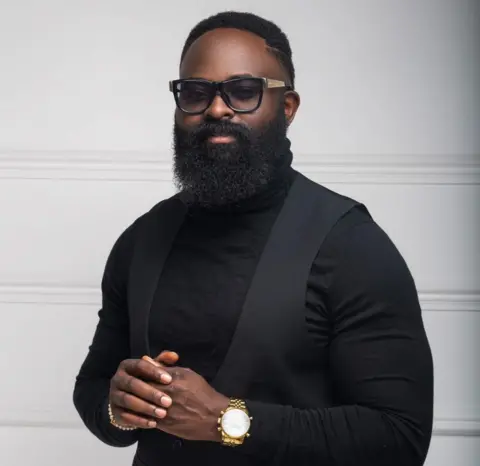 Afronation/Adesegun Adeosun Jr
Afronation/Adesegun Adeosun Jr
No expense was spared when it came to acts and it boasted performances from Afrobeats and Bashment icons such as Burna Boy, Davido, Busy Signal and Buju Banton.
Notable black British artists also graced the stage, such as J Hus, Ms Dynamite, Stefflon Don, Octavian, Mostack and Ms Banks.
As a self-proclaimed "soldier for a united Africa", SMADE thought it was worth the risk. It was important, he says, "not just for black people, but for other races to come down and celebrate African culture coming together".
And come together they did - in droves.
Before the festival, many had compared it to the likes of failed urban music festivals, Fyre Festival and VestiVille. The racial undertones of the criticism, SMADE says, made him more determined for it to be a success.
"We had a lot of doubters and naysayers," he says. "Sometimes black people don't like to support one another until it is successful."
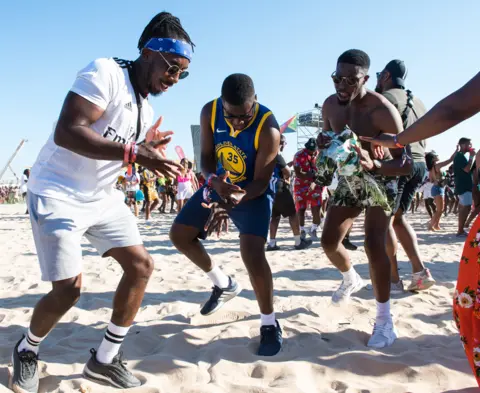 Michael Tubi
Michael Tubi
SMADE said he initially expected 5,000 attendees.
To his surprise, the first wave of tickets sold out and SMADE tripled his expectations.
He then he prepared in his own way.
"I fasted for three days and prayed with a team of about 55 people. I wanted it to go smoothly and it worked," he says.
"I wanted it to be a success and break stereotypes - and show you can have thousands of black people in one place and it can be incident free."
And, he says, it was.
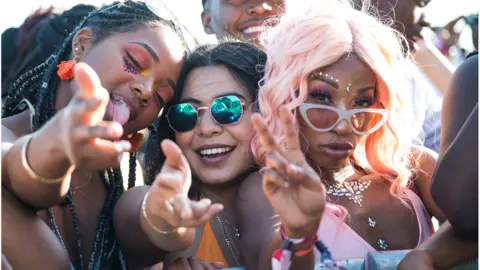 Michael Tubi
Michael Tubi
'Sound systems shook the ground'
By Shamaan Freeman-Powell, BBC News, at Afro Nation
It is not unusual for African and Caribbean people to point out each other's differences.
(Let's not even get into the plantain pronunciation debate...)
But Afro Nation proved both cultures have way more that unites, than divides them.
Sound systems shook the ground at beach parties, pool parties and boat parties - where you could find Jamaicans doing the Shaku Shaku and Nigerians Dutty whining.
The sun beamed down on people of all creeds, shapes, shades and sizes - and every one of them was celebrated, unapologetically.
Some wore the colours of their native countries while others opted for a riotous clash of neon, glitter and sparkling embellishments
In the year Stormzy was praised for being the youngest black male to headline Glastonbury, Afro Nation proved, unequivocally, that there are dozens of talented black artists, often ignored by the mainstream, who are more than ready to grace main stages.
People from all over the world soaked up the atmosphere, enjoyed the food and music and learned the latest dance moves.
Locals stared in bemusement at the abundance of black and brown faces before taking pictures from the sidelines, expressing their joy for the festival's success.
For me though, the highlight of the festival was seeing flags from more countries than I could count swaying in the cool summer breeze, proudly representing one nation, one people, one Africa.

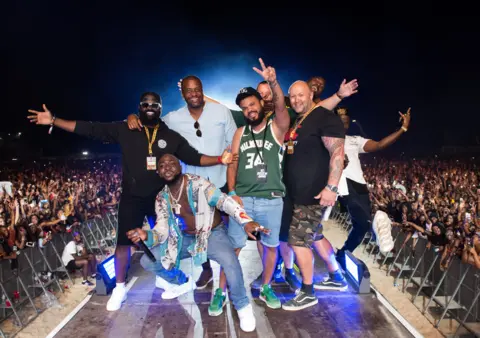 Michael Tubi
Michael TubiLooking forward, SMADE says he hopes the festival will shine a light on black talent throughout Europe, Africa and the Caribbean and inspire the next generation to work together.
"It showed the world what talented artists we have and how beautiful our culture is," he says, adding that this was something that had inspired him.
He travelled to London from Lagos, Nigeria aged 19 to study advertising and marketing at the University of Arts, London.
As the oldest son of 13 children, the pressure was on to be successful and "lead by example".
"The younger ones were looking up to me, so I ran away from anything dodgy, like drugs, gangs or alcohol," he says.
"Even now, I don't drink or smoke, I only tried alcohol when I was 30 - because even my dad encouraged me to 'release a little.'"
SMADE studied full time alongside working at a post office and in various retail positions - all to fund his promotions.
"At first I didn't even know I was a promoter. I was in my first year at uni and was throwing house parties every weekend."
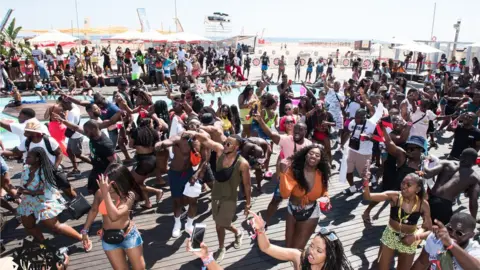 Afronation/Adesegun Adeosun Jr
Afronation/Adesegun Adeosun JrBefore long, he left the house parties behind and took his Afrobeats raves to bigger and better venues.
"Afrobeats was popular but not in clubs. I was hitting a niche market, so as time went on we ended up selling out clubs across the country."
Over the past decade, SMADE made great contacts with upcoming Afrobeats stars such as Davido and Wizkid, hosting huge events and contributing to the massive success of Afrobeats in the UK.
But in 2016 SMADE says he became "a victim" of his own success and "lost everything".
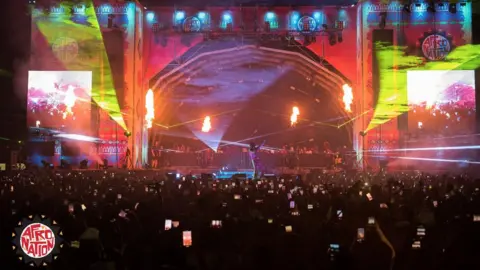 Afronation/Adesegun Adeosun Jr
Afronation/Adesegun Adeosun Jr
He had held a sold out show at an arena, when almost 2,000 people without a ticket "rushed the doors".
Guests had to be refunded, damages had to be paid to the venue and he had to save his reputation with the emergency services.
"It was embarrassing. It was the only time I ever thought about not doing this business again."
But he praises his wife and mother of their three children, who inspired him to carry on.
SMADE says the bad experiences became lessons which prepared him for Afro Nation and gave him the confidence to persevere when ticketholders started re-selling tickets, and some performers took to social media to announce they had pulled out.
"They didn't believe. And I know they regret it now," he says.
"But it's a lesson - we should all believe in black companies and not just support Glastonbury or Wireless."
